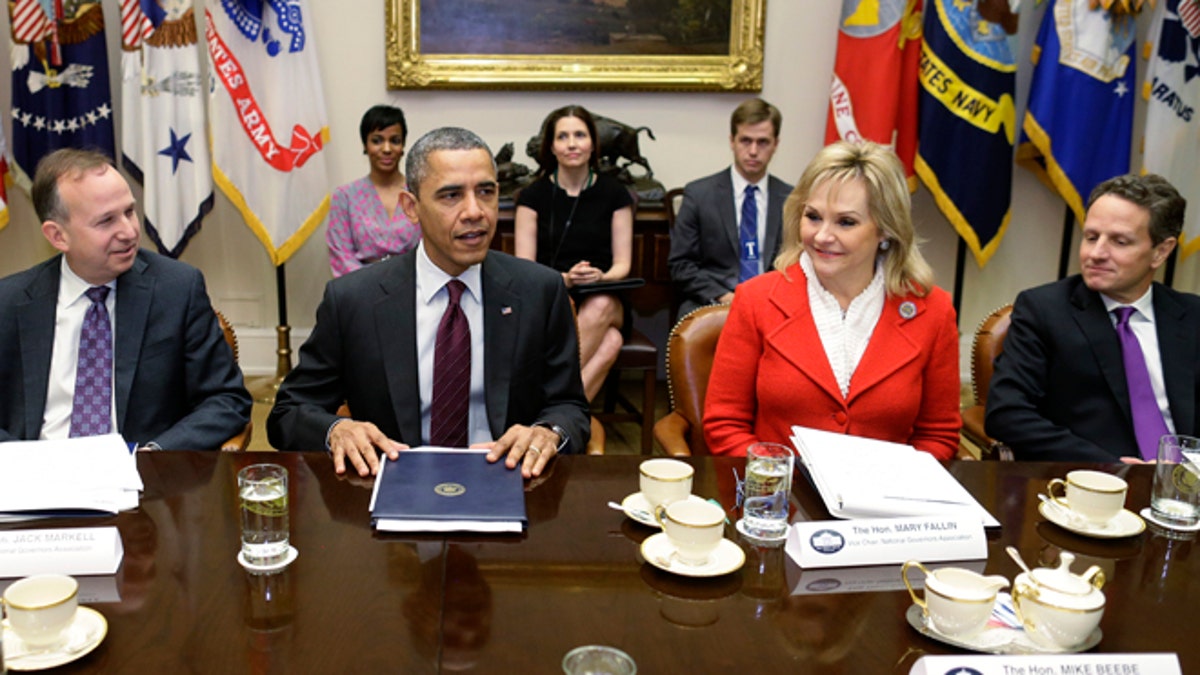
FILE: Dec. 4, 2012: President Barack Obama, (l) National Governors Association Chairman and Delaware Gov. Jack Markell, and Vice Chair Oklahoma Gov. Mary Fallin at the White House in Washington. (AP)
While President Obama campaigns hard for Congress to raise taxes on America’s highest earners — insisting on no deal to resolve the looming fiscal crisis without it — there is little evidence to back up his sales pitch that it will go a long way to reducing the nation’s runaway deficit.
In fact, history shows that similar tax hikes resulted in less additional revenue than expected, and other unintended consequences.
Economists point to then-British Prime Minister Gordon Brown’s proposal in April 2010 to increase the marginal tax rate by 10 percent — to 50 percent — on residents earning more than $1 million. As a consequence, the number of people declaring that amount of income or more dropped from 16,000 to 6,000 in the 2010-2011 tax year, according to Her Majesty’s Revenue and Customs, the United Kingdom’s tax collection agency.
Before Brown’s proposal, Britain’s wealthiest composed roughly 9 percent of the country’s tax pool. That percentage dropped by half — to roughly 4.4 percent — after the proposal.
It is believed that rich Britons moved abroad or took steps to avoid paying the new levy by reducing their taxable incomes, according to a report in the London Telegraph.
Could enactment of Obama’s tax hike on high earners — raising the marginal rate to 39.6 percent, from 35 percent — in return for preserving existing Bush-era rates on Americans earning less than $250,000 annually have a similar effect?
“Obama’s main goal in the fiscal cliff negotiations is to impose a class-warfare tax hike,” said Daniel J. Mitchell, a fiscal policy expert at the Cato Institute, a Washington-based, libertarian think tank. “When you’re trying to stick it to the ‘rich,’ you need to understand that they have tremendous control over the timing, level and composition of their income. So unlike the rest of us, they can respond very easily when the government goes after them.”
For example, one option open to America’s high earners to reduce taxable income would be to move their wealth into tax-free bonds, Mitchell said.
While top earners have options to reduce their taxable income in the face of any tax increases, one economist says existing tax laws don’t make it easy.
“It is very hard to do after the Tax Reform Act of 1986,” Kent Smetters, an economics and public policy professor at the University of Pennsylvania Wharton School, told FoxNews.com. "You’ve basically got to figure out how to either reclassify the income as capital gains (to get a lower tax rate) or classify the money as earned outside of the United States. Both are nearly impossible, usually requiring tax shelters that the Treasury Department can deem as illegal.
“The reason why the rich already pay so much of the U.S. tax base is because they have a hard time avoiding it,” Smetters said.
- Republicans Resist Reality in the Age of Obama
- Republicans Resist Reality in the Age of Obama
- Detroit councilwoman to Obama: We voted for you, now bail us out
- First of Obama Cabinet nominees expected by January
- Guide to the fiscal crisis — how bad can it get?
- Ryan, Rubio plot party future as 2016 talk starts




